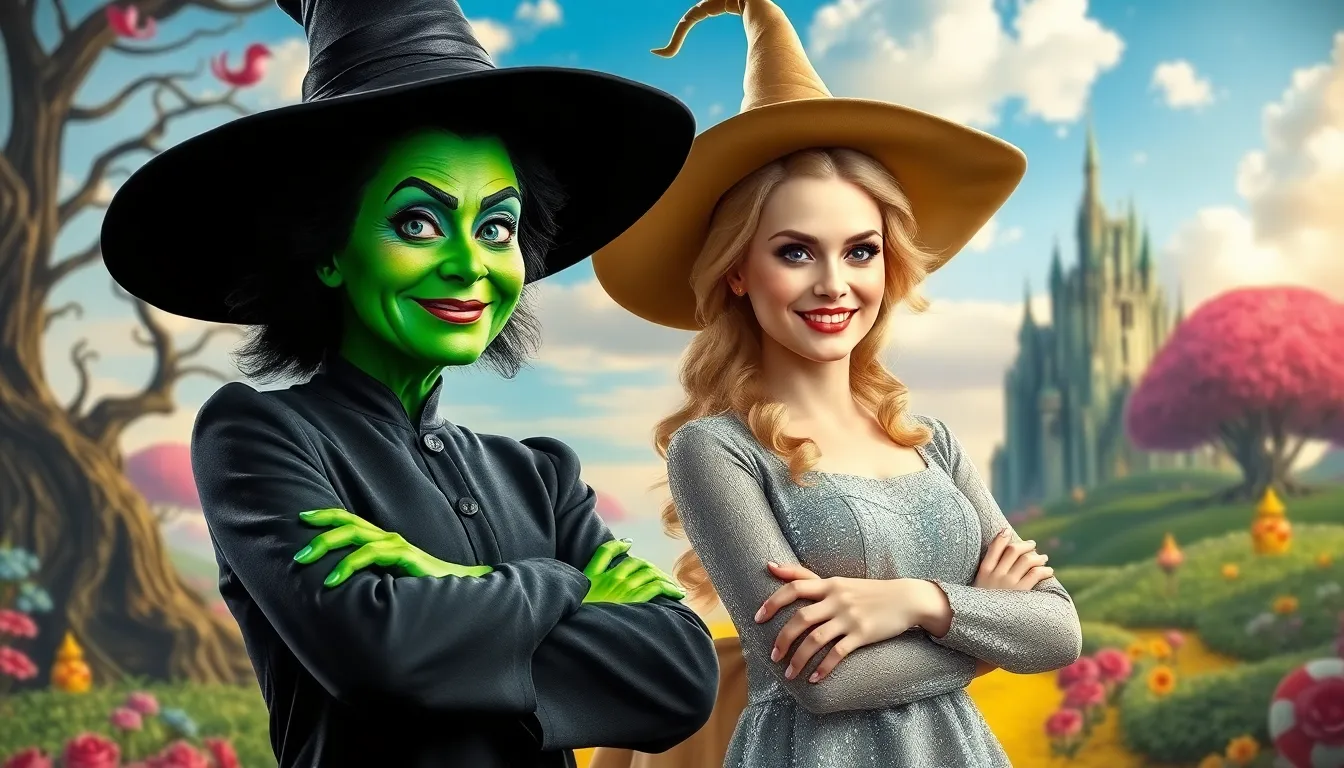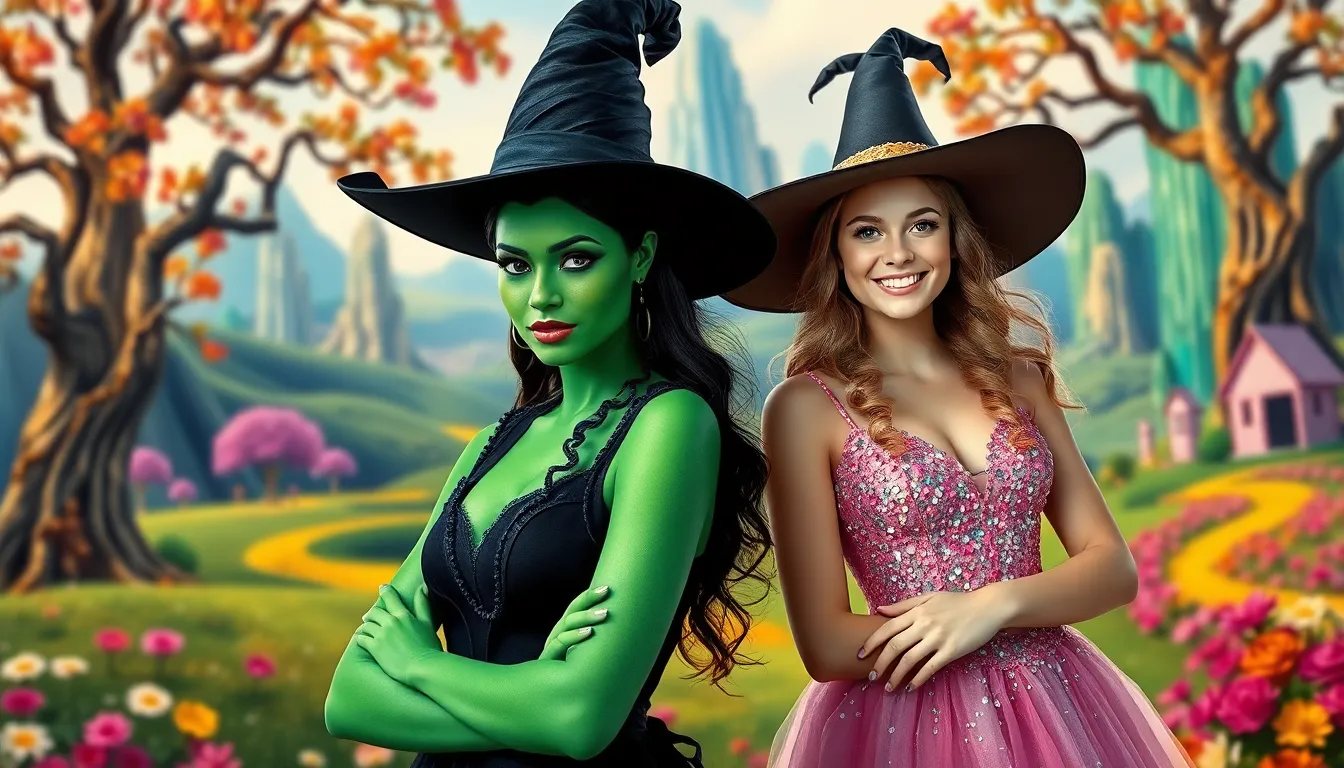Wicked takes audiences on a spellbinding journey through the untold story of the witches from the beloved Land of Oz. This groundbreaking musical explores the complex friendship between Elphaba, the misunderstood Wicked Witch of the West, and Glinda, the Good Witch. As their paths intertwine, the narrative delves into themes of identity, acceptance, and the consequences of societal expectations.
Set against the backdrop of a vibrant and magical world, Wicked challenges preconceived notions of good and evil. Through powerful songs and unforgettable performances, it invites viewers to reconsider the true nature of wickedness and the choices that define us. With its rich storytelling and captivating characters, Wicked has become a modern classic, resonating with audiences of all ages.
Table of Contents
ToggleOverview of Wicked
“Wicked” delves into the backstory of iconic characters from L. Frank Baum’s “The Wonderful Wizard of Oz.” The narrative unfolds in the enchanted Land of Oz, where Elphaba, later known as the Wicked Witch of the West, grapples with her unique magical abilities and the prejudice they provoke. The dynamic between Elphaba and Glinda highlights contrasting personalities; Elphaba’s fierce independence and intellect clash with Glinda’s charm and conformity.
The musical examines the societal structures that dictate perceptions of good and evil. Through their evolving friendship, themes of loyalty, betrayal, and personal growth emerge. The characters face challenges that complicate their identities, fostering an environment where viewers confront their assumptions about morality.
Key musical numbers enrich the storytelling, including “Defying Gravity,” which embodies Elphaba’s desire for freedom and acceptance. As the plot unfolds, audiences witness Elphaba’s transformation into the misunderstood villain, prompting reflections on the nature of wickedness and the complexities of human experience.
“Wicked” captivates audiences with its dynamic performances, rich character development, and exploration of timely social issues, solidifying its status as a modern classic in musical theatre.
Main Characters

The musical “Wicked” features prominent characters whose complex relationships and individual journeys drive the narrative forward. Understanding these characters enriches the audience’s experience of the underlying themes.
Elphaba
Elphaba, known as the Wicked Witch of the West, possesses exceptional magical powers marked by her emerald green skin. She embodies qualities like intellect, determination, and a strong sense of justice, often at odds with societal expectations. Elphaba challenges traditional views of good and evil through her quest for identity and acceptance. Her transformation into a misunderstood figure highlights the impact of prejudice and the struggle for self-acceptance. Key moments, particularly in songs like “Defying Gravity,” reveal her yearning for freedom and her defiance against an unjust society.
Glinda
Glinda, the Good Witch, presents a contrast to Elphaba with her bubbly personality and adherence to social norms. Initially portrayed as superficial and charming, she evolves throughout the story, revealing deeper layers of loyalty and strength. Glinda’s relationship with Elphaba serves as a central element in the narrative, showcasing the tension between conformity and individuality. As the story progresses, Glinda grapples with her feelings for Elphaba and her beliefs about right and wrong, ultimately choosing to embrace her friend’s complexities. Through songs like “Popular,” Glinda highlights themes of acceptance and the often-blurred lines between good and evil.
Plot Summary
“Wicked” intricately weaves its narrative through two acts, revealing the complexities of friendship, identity, and societal norms within the Land of Oz.
Act One
Act One introduces Elphaba, the Green Girl, who struggles with her magical gifts and faces discrimination due to her appearance. Her unique abilities contrast sharply with the norms of her society. Elphaba meets Glinda at Shiz University, where their initial antagonism evolves into a deep, albeit complicated, friendship. Themes of ambition and acceptance surface as they encounter other key characters, like Fiyero, who sparks a love triangle that adds tension to their relationship. The act culminates in the iconic song “Defying Gravity,” where Elphaba embraces her identity and intentions to defy societal expectations, setting the stage for her transformation into the misunderstood Wicked Witch.
Act Two
Act Two delves into the fallout from Elphaba’s choices and expands on her conflict with the Wizard of Oz and the regime he represents. It explores the implications of her newfound independence and the consequences of her rebellion against the established order. Glinda grapples with her loyalty to Elphaba and her own ambitions, positioning her in a moral quandary. The act features key developments, including the fallout from Elphaba’s actions and growing societal tensions, ultimately leading to a poignant moment of reconciliation between her and Glinda. Through powerful numbers like “For Good,” the narrative encapsulates themes of sacrifice, growth, and the impact of friendship on personal journeys.
Themes and Messages
“Wicked” explores profound themes, including friendship, loyalty, prejudice, and acceptance. The narrative challenges societal norms and encourages introspection about personal beliefs and moral values.
Friendship and Loyalty
Friendship serves as a central theme in “Wicked,” particularly the complex relationship between Elphaba and Glinda. Their bond evolves amidst conflict, revealing layers of loyalty that often blur moral lines. Elphaba’s fierce independence contrasts with Glinda’s desire for acceptance, leading to moments of betrayal and reconciliation. This dynamic emphasizes the importance of understanding and solidarity, even when individuals face societal pressures. Songs like “For Good” poignantly express the impact of their friendship on personal growth, highlighting how true loyalty transcends superficial differences.
Prejudice and Acceptance
Prejudice permeates the narrative, particularly in Elphaba’s experiences with discrimination due to her green skin and magical abilities. This prejudice shapes her identity and fuels her quest for acceptance. The musical critiques societal expectations that dictate notions of good and evil, prompting viewers to reflect on their biases. Glinda’s transformation from a conformist to a more accepting friend also illustrates the journey toward understanding. The contrast between Elphaba’s struggles and Glinda’s initial superficiality underscores the significance of embracing individuality, making “Wicked” a powerful commentary on societal acceptance and personal identity.
Musical Adaptation
The musical “Wicked,” based on Gregory Maguire’s novel, features a rich blend of storytelling and music. It transformed the original tale by offering deeper insight into the characters’ motives and backgrounds. Stephen Schwartz composed the score, which combines powerful melodies with poignant lyrics.
The adaptation debuted on Broadway in 2003, receiving critical acclaim and numerous awards. The production’s innovative staging and vibrant choreography elevated the narrative, creating an immersive experience for audiences. The diverse musical numbers, like “Defying Gravity” and “For Good,” resonate with themes of empowerment and friendship.
The character development stands out in the adaptation. Elphaba’s transformation from a misunderstood outcast to a symbol of rebellion parallels Glinda’s journey from a superficial beauty to a woman of substance. Their evolving dynamic conveys complex portrayals of friendship, loyalty, and the nuances of right and wrong.
Wicked’s impact extends beyond the stage, influencing popular culture and inspiring discussions about inclusion and acceptance. The show’s ability to challenge societal norms through its engaging narrative and memorable music solidifies its place as a staple in modern musical theatre.
“Wicked” stands as a transformative exploration of friendship and identity within the fantastical realm of Oz. Through Elphaba and Glinda’s complex relationship, it challenges the audience to reconsider preconceived notions of good and evil. The musical not only entertains with its powerful score and engaging performances but also sparks meaningful conversations about acceptance and societal expectations.
By delving into the characters’ struggles and growth, “Wicked” invites viewers to reflect on their own biases and the impact of their choices. Its enduring popularity and critical acclaim underscore its significance in modern theatre, making it a must-see for anyone seeking a rich narrative experience.








